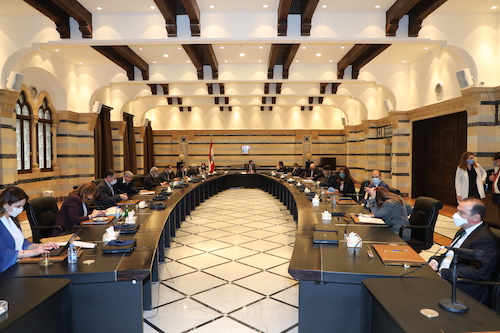The Council of Ministers had discussed the cabinet’s draft financial reform program, in its meeting chaired by HE Prime Minister Hassan Diab.
In the beginning of the session, Prime Minister Diab delivered a speech in which he referred to the completion of the first repatriation phase of Lebanese expatriates, praising the good performance at all levels and in all relevant ministries and departments, as well as the efforts made by all ministers, Middle East Airlines, and Beirut Rafic Hariri International Airport management.
He added: “We are faced with the challenge of continuing to deliver the same level of performance in the following stages, and we have to address some of the gaps that appeared in the first phase”.
Prime Minister Diab went on to say that “We will pursue the largest expatriates ‘evacuation wave in Lebanese history, but ironically, this process is in the opposite direction this time. In fact, we have always used to expatriate Lebanese abroad to flee our internal situation, while today we are conducting a counter mission, as we are evacuating, in the sense of repatriating, Lebanese to their homeland”.
Prime Minister Diab continued: “Despite the bleak picture and the difficult situation we are going through, what is happening is very important. The Lebanese are demanding to return to their homeland because they have strongly regained confidence in their government. The Lebanese, who had little or no confidence in their State, compared to a great confidence in the capabilities and procedures of other countries of the world, have discovered for themselves that their State really deserves to be trusted, and this is a major achievement that we should not underestimate. On the contrary, we must promote and strengthen confidence-building, and work on increasing its level”.
He further added: The government is carrying out its duties, and is determined to protect the Lebanese at home and abroad, and therefore we will not spare any effort in this regard. As for social affairs, lists that will be benefitting from financial and social assistance are nearing completion, and have been approved by the Council of Ministers. Tomorrow, Wednesday, we will announce the launching of the process through the Lebanese army which has also completed relevant logistical preparations and is ready to complete the process within a few days.
As for the financial and monetary situation and the reform program, the Prime Minister has made it clear that preliminary ideas have been elaborated for further discussion and modification, if any, in order to come up with a complete version of this plan.
Later on, the cabinet focused on discussing the headings of the reform program, which is an internal Lebanese study that takes into consideration the current situation in the country.
This program seeks to address large current account deficits accumulated over the years, a huge financial sector and nine years of deterioration in the balance of payments as the need for the dollar increased, which required attracting foreign currencies. This has led to high public debt, a deficit in the state budget, a deficit in the banking sector, and a cash deficit, resulting in the need for debt restructuring and the reshuffling of the Central Bank and the banking sector as a whole.
For the first time, a homogeneous and integrated Lebanese plan is being prepared in an attempt to reach a shared conviction with regards to redressing the financial and monetary situation and reaching continuous growth, in the hope that this plan will be up to the expectations of the Lebanese people, bondholders and donors abroad.
We did not go for the easiest solutions.
This plan has been drafted with a positive spirit in order to resolve the current crisis.
According to this plan, direct support will be provided to the poor, while preserving their rights and hundreds of millions of dollars.
There will not be any reduction in salaries.
The plan offers a sustainable solution.
People will not be incurring losses, since the damage has already occurred and we are trying to bounce back.
There are major problems with the trade balance, a rift between the official currency exchange rate and the market price.
There is a deterioration in social indicators and public finances. A large banking sector that is not meeting depositors’ needs. All this has led to the October 17 uprising.
Lebanon is currently in need of external support. This involves as well a high cost for the Lebanese.
We are focusing on holding the individuals involved accountable.
The second component of financial reforms includes the main following points:
1- External support (like Cedre and others)
2- Fiscal consolidation
3- Public debt restructuring
4- Central Bank of Lebanon and banking sector restructuring
5- Some structural reforms to be carried out: combating corruption, reforming the judicial system, setting indicators to measure growth, sectoral reforms, passing accumulated laws and Cedre conference-related laws.






